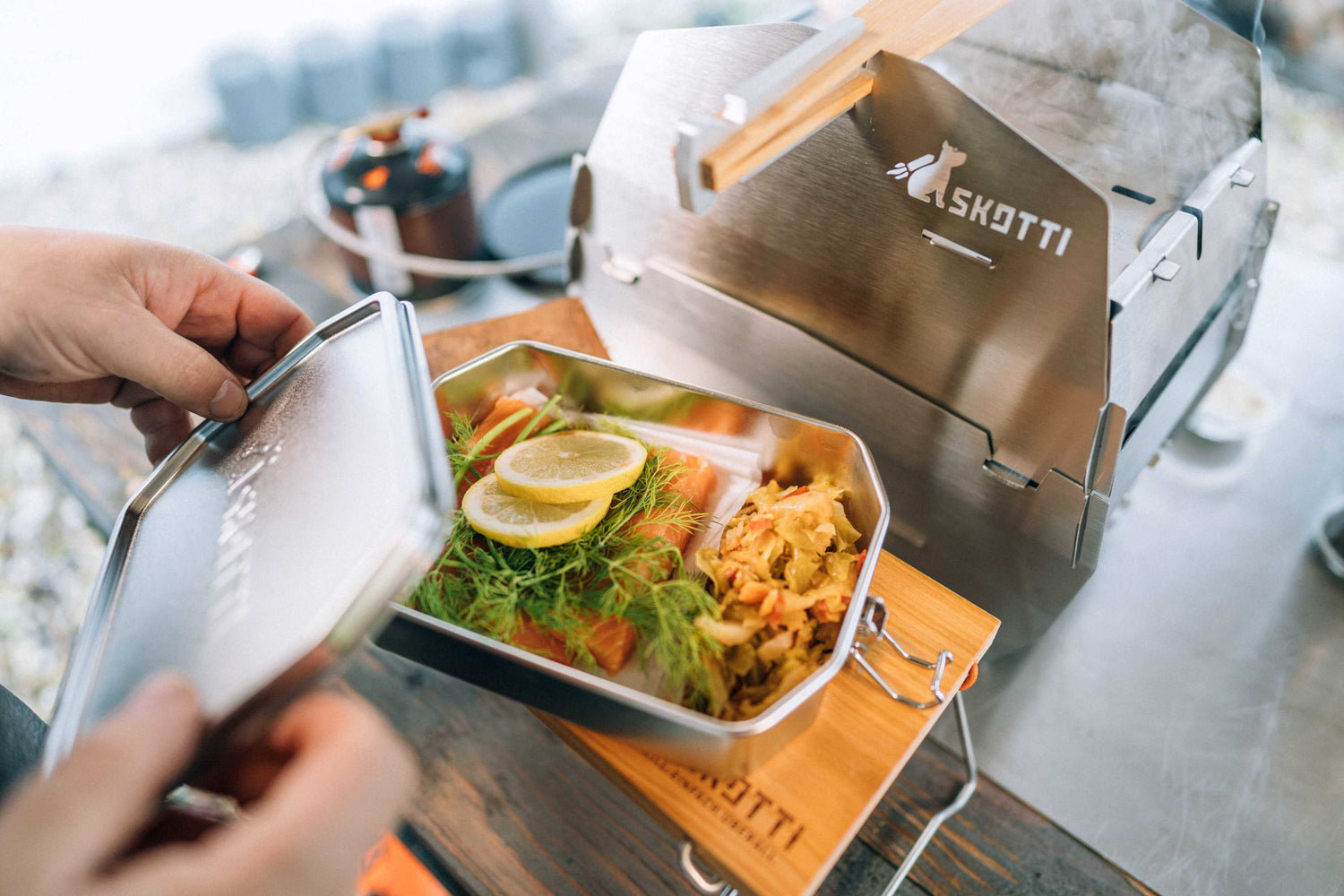Whether it's summer, fall, or winter—who can resist the delicious aroma of grilled food? If you're one of those barbecue enthusiasts who grills year-round , you've probably already come across the topic of sustainability. In this article, we'll take you on a journey into the world of sustainable grilling and show you how you can make a big difference with small changes. So grab your tongs and let's get started!
Charcoal: focal point of the environmental debate
Between 2017 and 2020, WWF conducted in-depth research into the origin of charcoal in Germany and Europe. It warns against products from questionable sources, as they are significantly involved in illegal deforestation of tropical rainforests and contribute to climate problems. Charcoal production in these regions not only promotes deforestation, but also poses a threat to local flora and fauna, contributing to the exacerbation of climate change.
We therefore recommend purchasing FSC-certified charcoal , which guarantees sustainable forestry. TÜV Rheinland tests charcoal for safety and environmentally friendly origin from sustainable forest management. TÜV Rheinland also conducts comprehensive testing procedures to ensure that charcoal meets high safety and quality standards and does not release any hazardous substances. These tests not only test the burning properties and emissions, but also verify the origin of the charcoal to ensure sustainability and environmentally friendly production.
Tip : You can get FSC-certified charcoal in many hardware stores, supermarkets and gas stations.
Ecological Grilling: How your barbecue evening protects the environment
As you've just learned, there are different types of charcoal available. Use sustainable charcoal , as there's no shortage of alternatives to conventional charcoal. Alternatives include bamboo, coconut shells, or olive pits.
Charcoal made from local beech trees also sets an example for the environment, while other charcoal is shipped in from illegally logged forests in Africa or South America. Use sustainable charcoal and, when purchasing, be sure to look for wood certifications such as FSC, PEFC, and Naturland , as these indicate sustainable forestry. Terms like 'not tropical wood,' 'naturally sourced,' etc., are not sufficient.
Use environmentally friendly alternatives to traditional charcoal grills:
- Electric grills : They produce no direct emissions and can be powered by green electricity. They also avoid the release of pollutants produced during combustion, thus contributing to a cleaner and healthier grilling environment.
- Solar grills : They use the energy of the sun and do not require any additional fuel.
- Gas grills : Compared to charcoal grills, they emit significantly less particulate matter and climate-damaging emissions, making them a more environmentally friendly choice. They also allow for more precise temperature control, reducing energy consumption and thus minimizing environmental impact.
- Grills with sustainable fuels : Use grills that can be powered by environmentally friendly fuels like coconut charcoal or wood pellets from sustainable forests. These alternatives help reduce your carbon footprint while often being just as effective and user-friendly as traditional grills.
6 tips for environmentally friendly grilling
Grilling is a part of our lives. But while we enjoy juicy steaks and crispy sausages, we should also consider the environment. What we put on the grill and what we use to fuel it has a direct impact on our planet . But don't worry, sustainable grilling is easier than you think! Here are some tips to make your barbecue more environmentally friendly:
1. Be careful when choosing a barbecue lighter
Chemical barbecue lighters are plentiful, but it's best to use wood or cardboard firelighters . Firelighters are made from renewable resources and help you get your barbecue going.
2. Invest in a sustainable grill

SKOTTI : our superhero for sustainable grilling. It combines sustainability and flexibility in a compact design – ideal for grilling in any dream location. It also impresses with its multifunctionality, as you can transform it not only as a grill but, with the right accessories, into a complete outdoor kitchen .
3. Use reusable instead of disposable
You've probably heard this from the supermarket or hardware store: Stay away from disposable grills . But why spend money on such nonsense if it's just going to end up in the trash? Also, avoid aluminum grill trays, as they're considered harmful to your health. There are plenty of alternatives for grilling vegetables, fish, or feta.
4. Use your own dishes
Are you an adventurer who regularly grills on the road or loves barbecues in the park? Then use reusable cookware . Our boxes are practical companions that not only transport your grilled food but also double as a pot. Our pikes are also perfect for vegetable skewers.
5. Consume meat consciously
Do you love meat and can't live without it? Then buy organic and regional products – quality over quantity. So, opt for meat from your local butcher and avoid pre-packaged goods from factory farms.
6. Cricket (increased) Veggie

The high consumption of animal products is also bad for our climate, so enjoy them in moderation. There are now so many delicious alternatives for the grill . Whether vegetarian or vegan meats, mushrooms, corn, or delicious vegetable skewers – get inspired and try new recipes.
7. Pay attention to fire safety
Safety is important both before and during grilling. Especially with gas grills, you should observe certain safety precautions before lighting them .
Want to have a barbecue with your family in the park around the corner? Check beforehand to see where public barbecues are permitted . Also, be considerate of your neighbors if you're barbecuing on your balcony or in your garden, for example, and other people live above you. A gas grill is the perfect choice here, as it produces little smoke.
Recipes for a greener planet
Away from the throwaway culture and toward conscious enjoyment that not only benefits us but also the environment. In this section, we present you with creative recipe ideas that demonstrate how diverse and delicious sustainable grilling can be. Whether exotic desserts, vegetarian highlights, or regional meats – here you'll find inspiration to make your barbecue evening a green highlight:
- Zucchini Lasagna : Delicious, light, and juicy. Our zucchini lasagna is a delight for all vegetable lovers, and even those who are new to it. It's ideal as a main course or as a side dish with cheese or regional meats.
- Grilled Pineapple : This popular tropical fruit unfolds its unique flavor on the grill, promising a true explosion of flavor: tingling, sweet, and fresh – evoking summer feelings on the tongue. Served with a dollop of mint yogurt or optional vanilla ice cream, this tropical dessert is a refreshing highlight of any barbecue.
- Venison sausage with bell pepper and sweet potato skewers : This recipe combines the savory, spicy flavor of local venison with the sweetness of sweet potatoes and the tangy notes of bell peppers. This combination, along with a refreshing yogurt dip, offers a flavor-balanced yet sustainable barbecue experience.
Frequently Asked Questions
Why is sustainable grilling important for the environment?
Sustainable grilling is more environmentally friendly than traditional grilling because it protects the environment by using sustainable fuels, reusable products, and mindful meat consumption. Conscious, sustainable grilling can reduce CO₂ emissions, avoid waste, and have an overall more positive impact on the environment.
What alternatives are there to traditional charcoal grills?
As an alternative to charcoal grills, choose a gas or electric grill. Both are more environmentally friendly options. Gas grills score points for their quick start-up and lower emissions, while electric grills, when powered by green electricity, are virtually emission-free and are particularly suitable for use indoors or on balconies. There are also innovative solutions such as solar grills that harness solar energy, thus offering a green alternative to charcoal grills.
How can I make my barbecue party waste-free?
You can celebrate a waste-free barbecue party by following a few important points:
- Use reusable tableware
- Offer drinks in reusable bottles
- Use cloth napkins
- Avoid packaging waste
- Set up a recycling station
By following these tips, you can host a fun and eco-friendly barbecue that is good for your guests and the planet.



